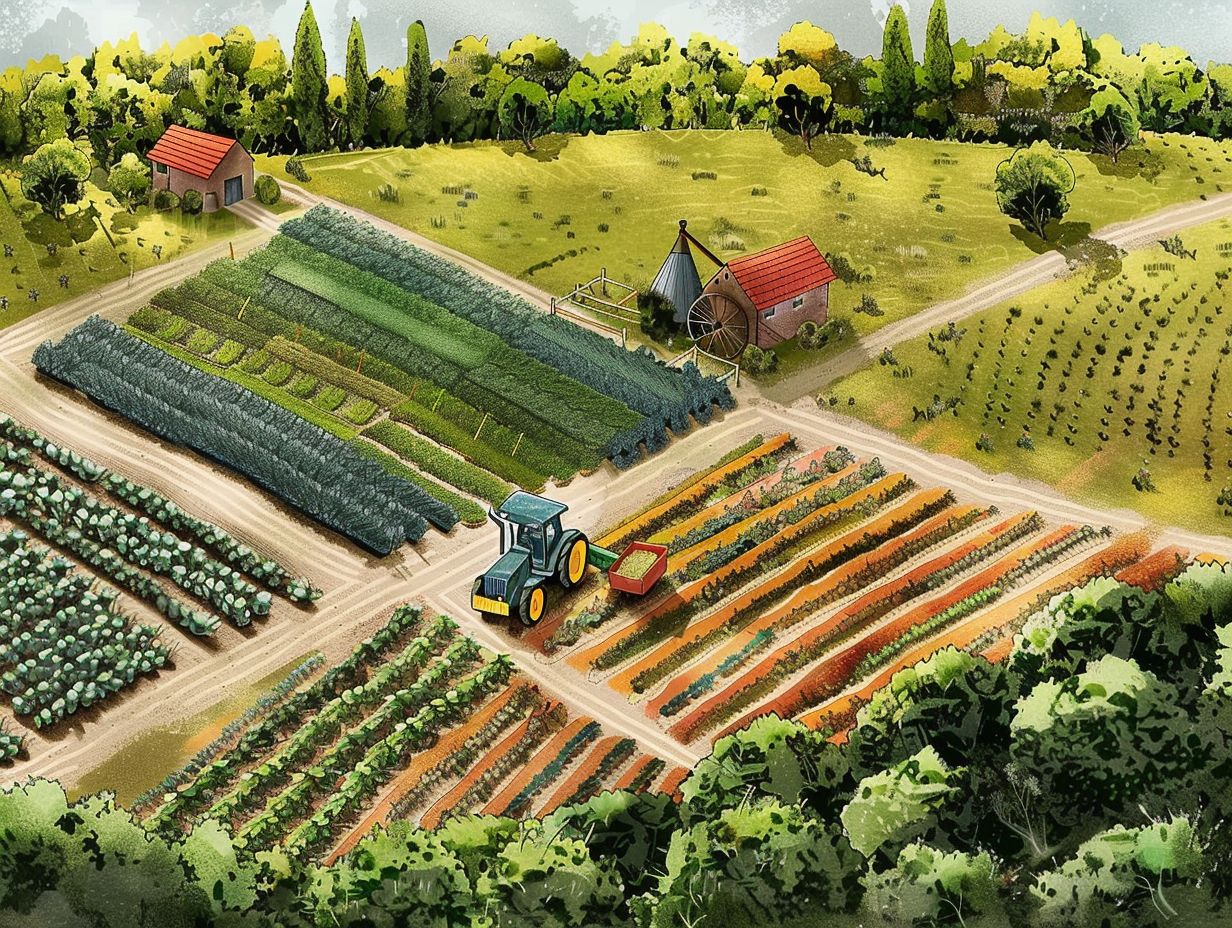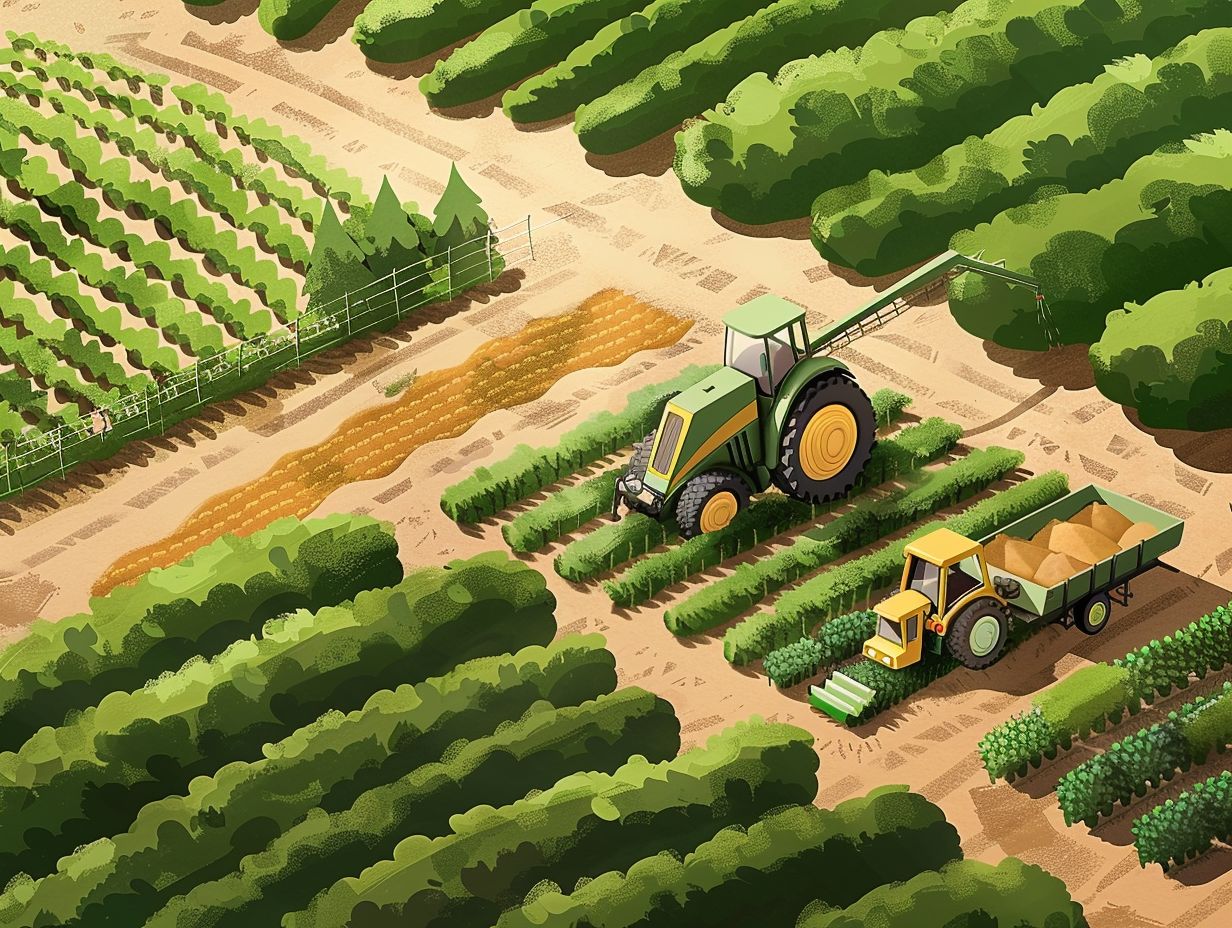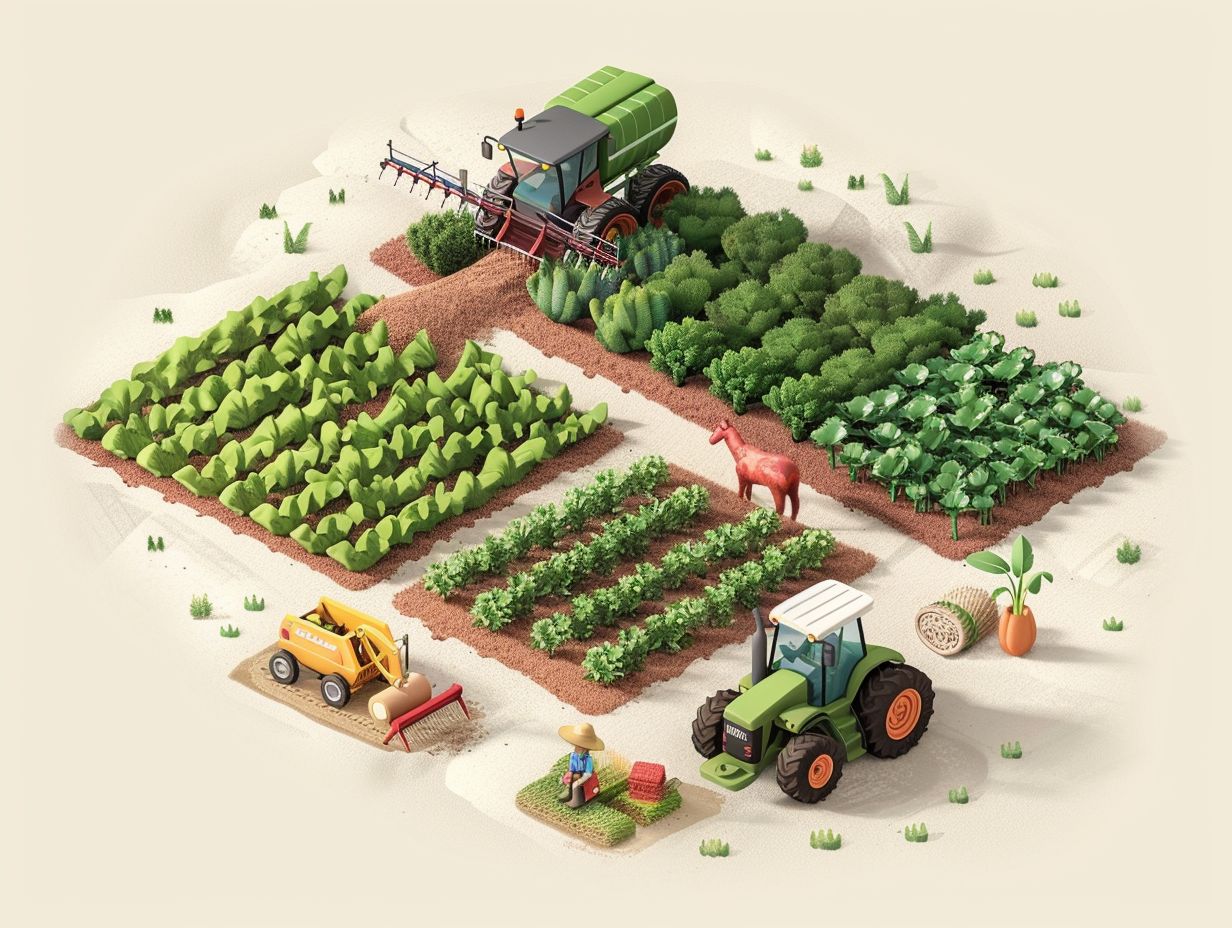In Florida’s agricultural industry, protecting intellectual property (IP) is crucial for fostering innovation and maintaining a competitive edge. This article will explore the various types of IP protection available, such as patents, trademarks, copyrights, and trade secrets, and explain why they are essential for agricultural advancements in the state.
We will discuss the steps to take before applying for IP protection, filing for protection in Florida, and enforcing your rights. Learn more about common IP issues in the agricultural sector and how to navigate them effectively.
Key Takeaways:
- Intellectual property (IP) protection is crucial for agricultural innovations in Florida to safeguard against imitation and promote innovation.
- Florida’s IP laws provide various avenues for protection, including patents, trademarks, copyrights, and trade secrets.
- Steps such as conducting a thorough search and filing for IP protection can help ensure the successful enforcement of your agricultural innovations in Florida.
Why is IP Important for Agricultural Innovations in Florida?
In Florida, Intellectual Property (IP) holds significant importance for agricultural innovations, playing a crucial role in fostering creativity, protecting new inventions, and enhancing the economic landscape of the agricultural sector.
Benefits of IP Protection for Agricultural Innovations
IP protection offers a variety of advantages for agricultural innovations, including protecting the creativity and intellectual assets of businesses and inventors. This protection provides a sense of exclusivity, enabling inventors to gain a competitive advantage in the market.
For instance, a seed company that obtains intellectual property rights for a genetically modified crop can prevent others from reproducing their innovations, giving them a significant edge. IP protection can also attract more investors interested in supporting unique and safeguarded agricultural technologies, leading to increased funding opportunities for further research and development.
In the competitive environment of the agricultural sector, safeguarding intellectual property can play a crucial role for companies aiming to stay ahead.
Understanding Florida’s IP Laws for Agricultural Innovations
Understanding Florida’s IP laws is crucial for individuals engaged in agricultural innovations, as these laws establish the structure for safeguarding intellectual property and ensuring that inventors and businesses can efficiently secure their rights.
Patents
Patents serve as a form of intellectual property protection that provides inventors with exclusive rights to their inventions, prohibiting others from producing, using, or selling the patented creation without authorization.
The process of acquiring a patent entails submitting a detailed application to the United States Patent and Trademark Office (USPTO), where the invention undergoes examination to verify its eligibility for patenting. The USPTO plays a pivotal role in the patent-granting process by assessing the novelty, non-obviousness, and usefulness of the invention.
In the agricultural industry, inventions such as genetically modified seeds or innovative farming machinery can be patented. For instance, developments in crop modification methods or irrigation systems have obtained patents to safeguard the intellectual property of their inventors.
Trademarks
Trademarks serve to protect symbols, names, and slogans that businesses use to distinguish their products and services in the market, playing a crucial role in branding and competition.
When a business registers a trademark, it acquires exclusive rights to use that mark in association with the specific goods or services it provides. This registration process typically involves submitting an application to the relevant government office, such as the United States Patent and Trademark Office. Upon approval, the trademark owner gains the ability to prevent others from using a similar mark that might lead to consumer confusion.
In the agricultural sector, trademarks like ‘Monsanto,’ ‘John Deere,’ and ‘Pioneer’ are prominent examples that have aided these companies in establishing strong brand identities and standing out in a competitive market.
Copyrights
Copyrights offer legal protection for original works of authorship, such as literary, artistic, and various other intellectual works, ensuring that creators maintain ownership of their creations.
This protection covers a broad range of works beyond the traditional fields of literature and art, including music compositions, software code, architectural designs, and even agricultural innovations.
For example, a farmer who devises a unique method to enhance crop yields may seek copyright protection for the documented description or artistic representations of that method.
Registering a copyright entails submitting an application to the appropriate copyright office, providing information about the work and its author, and paying a modest fee.
Trade Secrets
Trade secrets are confidential business information that gives a competitive advantage, safeguarded by law as long as it remains undisclosed and valuable.
Trade secrets in the agricultural industry may include exclusive seed formulas, innovative crop cultivation methods, or specialized processing techniques. To safeguard these assets, businesses can put in place measures like restricting access to sensitive information, having employees sign non-disclosure agreements, and using secure data storage systems.
Legal frameworks like the Uniform Trade Secrets Act and the Defend Trade Secrets Act provide ways for companies to uphold trade secret protection through civil litigation against individuals who misuse or reveal confidential information.
How to Protect Your Agricultural Innovations in Florida?
Securing agricultural innovations in Florida requires a good grasp of the legal frameworks, proactive measures to establish IP protection, and ensuring compliance with all legal obligations.
Steps to Take Before Applying for IP Protection
It is important to follow certain steps before applying for IP protection. This includes thoroughly documenting inventions, conducting a comprehensive search for existing IP, and seeking advice from an experienced IP attorney.
In terms of documenting inventions, this can help establish a clear record of the creative process and assist in proving ownership in case of disputes. Prior art searches are crucial to ensure the novelty of an invention and avoid infringing on existing patents or intellectual property rights.
Consulting with an IP attorney is essential as they can offer insights into the legal landscape, advise on available protection types, and assist with the IP application process.
Filing for IP Protection in Florida
The process of filing for IP protection in Florida involves submitting the appropriate applications to the USPTO to ensure compliance with all legal and procedural requirements.
In the case of patents, the filing process typically consists of providing a detailed description of the invention, outlining the claims that define the scope of protection sought, and including any necessary drawings. It is essential to conduct a comprehensive patent search to verify that the invention is not already patented.
Trademark applications necessitate details about the mark, its intended use, and samples demonstrating how it will be used in commerce. Copyright filings may require submitting copies of the work to be protected.
In terms of safeguarding trade secrets, the focus should be on maintaining confidentiality to prevent unintended disclosure.
Enforcing Your IP Rights in Florida
Enforcing IP rights in Florida necessitates a comprehensive understanding of the available legal systems for addressing infringements and the assistance of a knowledgeable IP attorney.
One crucial aspect of enforcing IP rights is monitoring for potential infringements. This entails conducting regular checks on competitors’ activities and market trends to identify any unauthorized use or reproduction of intellectual property.
If infringement is discovered, the subsequent step typically involves pursuing legal action, which may include sending cease and desist letters, commencing civil litigation, or seeking damages for the violations.
Alternatively, companies can consider utilizing alternative dispute resolution methods like mediation or arbitration to efficiently resolve IP conflicts.
In the agricultural sector, enforcement of IP rights frequently involves safeguarding plant varieties, trademarks on agricultural products, and inventions associated with farming techniques.
Common IP Issues in the Agricultural Industry in Florida
Common intellectual property (IP) issues in the agricultural industry in Florida involve challenges concerning market structure, competition, and the enforcement of IP rights.
Infringement
Unauthorized use of protected intellectual property can lead to legal disputes and enforcement actions, resulting in infringement of IP rights.
This issue is particularly relevant in the agricultural industry, where patents, trademarks, and copyrights are crucial for protecting innovations and creations. For instance, a case study involving a seed company suing a competitor for patent infringement illustrates how the unauthorized use of patented seeds can result in significant financial losses and damage to reputation.
Identifying IP infringements often requires thorough market research, monitoring competitors’ activities, and using technology tools like software that can track unauthorized use of digital content. From a legal perspective, rights holders have various remedies available, including cease-and-desist letters, injunctions, damages, and potentially criminal prosecution to enforce their intellectual property rights.
Licensing Agreements
Licensing agreements enable intellectual property (IP) holders to authorize others to utilize their IP, which can lead to business opportunities and encourage competition.
These agreements typically specify the terms and conditions for the licensee’s use of the IP, including duration and geographical limitations. Through a licensing agreement, the licensor can generate additional revenue streams without bearing the full responsibility of production or distribution.
Simultaneously, the licensee gains access to valuable IP assets that can enhance their products or services, bolstering their competitive advantage in the market.
In the agricultural industry, licensing agreements are frequently employed for seed technologies. This allows farmers to utilize patented seeds to enhance crop yield and combat pests.
International Protection
International protection of intellectual property (IP) involves navigating treaties and regulations to ensure that IP rights are upheld across different jurisdictions. This is crucial for businesses and individuals as it provides a framework for safeguarding their creations, inventions, and innovations from unauthorized use or exploitation.
One of the fundamental agreements facilitating international IP protection is the Agreement on Trade-Related Aspects of Intellectual Property Rights (TRIPS), which sets minimum standards for IP protection that member countries must adhere to.
To secure IP rights globally, entities can also consider filing for patents, trademarks, or copyrights in multiple countries through international treaties like the Patent Cooperation Treaty (PCT) or the Madrid System for the International Registration of Marks.
Frequently Asked Questions
What are Florida’s IP laws for agricultural innovations?
Florida’s IP laws for agricultural innovations refer to the legal protection of intellectual property related to agriculture in the state. This includes patents, trademarks, and copyrights for new and innovative agricultural products or processes.
What types of IP protection are available for agricultural innovations in Florida?
In Florida, agricultural innovations can be protected under patents, trademarks, and copyrights. Patents protect new and useful inventions, trademarks protect logos and branding, and copyrights protect original works of authorship.
Do I need to register my agricultural innovation for IP protection in Florida?
While registration is not mandatory for all forms of IP protection in Florida, it is highly recommended. Registering your agricultural innovation for IP protection provides legal evidence of ownership and can help you defend your rights in case of infringement.
What is the duration of protection for agricultural innovations under Florida’s IP laws?
The duration of protection for agricultural innovations under Florida’s IP laws depends on the type of protection. Patents typically last for 20 years, trademarks can be renewed indefinitely as long as they are in use, and copyrights last for the life of the creator plus 70 years.
What happens if someone infringes on my agricultural innovation in Florida?
If someone infringes on your agricultural innovation in Florida, you have the right to take legal action to protect your IP rights. This can include seeking damages for any losses incurred due to the infringement, as well as stopping the infringing activity through a court injunction.
Are there any exceptions to IP protection for agricultural innovations in Florida?
Yes, there are some exceptions to IP protection for agricultural innovations in Florida. For example, certain types of agricultural processes may not be eligible for patent protection, and some uses of copyrighted material may be considered fair use. It is important to consult with an attorney to understand the specific laws and exceptions that may apply to your situation.



























Rate this article:
Average rating 0 / 5. Vote count: 0
No votes so far! Be the first to rate this post.
No Comments yet!